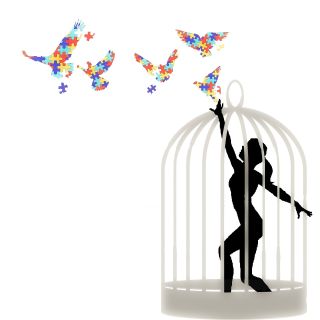Neurodiversity
Neurodiversity and Exacerbation of the Emotional Reaction
Symptomatic challenges of ASD reinforce emotional processing inhibiting choice.
Posted March 26, 2024 Reviewed by Michelle Quirk
Key points
- Continual emotional processing reinforces the activation of the amygdala, fueling emotional reactions.
- Habitual activation of the amygdala creates structural changes in brain areas used for proactive choice.
- Stimulation of visual processing mechanisms enhances innate analytical ability in individuals with ASD.

This post is Part 3 of a series.
When we are emotionally triggered, our stress hormones obscure our focus and inhibit our ability to make proactive choices, which can lead to unfavourable outcomes.
Ideally, when this happens, we would like to recognise that we are emotionally triggered and take a moment to pause and adjust to that reality. This will deactivate the amygdala and reduce the level of stress hormones in our body. Doing so will allow us to consider how to respond proactively, potentially leading to more favourable outcomes.
What if, however, we aren’t even aware of what it means or that we have the ability to make a proactive choice?
Research suggests neurodivergent individuals are inhibited in differentiating between emotional processing and proactive decision-making.
Interpreting Social Information
Challenges in socio-communication, socio-emotional regulation, and empathy for others limit the accurate interpretation of social information and how best to use it to consider an appropriate response in any given social interaction.
Unfortunately, we need to use these fundamental social skills repeatedly anytime and anywhere we engage with others, which happens many times daily.
For individuals with autism spectrum disorder (ASD), constant exposure to social interaction and the subsequent failure to effectively engage with others generates continued activation of the amygdala and high levels of stress that are sustained over a long time.
Effects on Brain Development
Research reveals that habitual emotional processing leads to the development of larger amygdala regions and thinner pre-frontal cortical thicknesses, brain areas responsible for proactive decision-making.
Repetitive emotional processing not only strengthens the assumption that there is no alternative way of operating but also leads to structural limitations in the brain that further inhibit recognising that adaptive proactive measures are possible.
This means that individuals with ASD live at the behest of a disruptive, emotionally triggering cycle that is overwhelming and exhausting, leading to repeated feelings of failure that are reinforced by the belief that there is no other way to respond to a given situation.
However, it is not all doom and gloom.
Visual Prompting
In 2009, researchers Souliéres and colleagues found that through measuring brain activity (via functional magnetic resonance imaging) in 15 matched ASD and 18 non-ASD individuals, visual prompting enhanced analytical ability in individuals with ASD, resulting in responses that were 43 percent faster than non-ASD controls. In contrast, without the stimulation of visual processing mechanisms, neurodivergent individuals recorded the slowest and most ineffective results.
So, what is this telling us?
Individuals with ASD are continuously drawing on emotional processing mechanisms not because they choose to. Their analytical ability, accessed through the pre-frontal cortical regions, is innate and considerably faster than neurotypical individuals.
However, without the activation of visual processing mechanisms, analytical reasoning remains inhibited. This not only reduces the awareness that proactive choice is possible but also significantly impacts the experiences felt by individuals with ASD as they interact with the world around them.
Being unable to effect positive change through proactive choice reinforces the negative outcomes they experience, subsequently affecting their self-esteem and overall mental well-being.
References
Dvorak, J. (2022). The Impacts of Chaotic and Stressful Environments on Self-Regulation in Children.
Pouw, L. B., Rieffe, C., Oosterveld, P., Huskens, B., & Stockmann, L. (2013). Reactive/proactive aggression and affective/cognitive empathy in children with ASD. Research in Developmental Disabilities, 34(4), 1256–1266.
Schreiter, M. L., & Beste, C. (2020). Inflexible adjustment of expectations affects cognitive-emotional conflict control in adolescents with autism spectrum disorder. Cortex, 130, 231–245.


